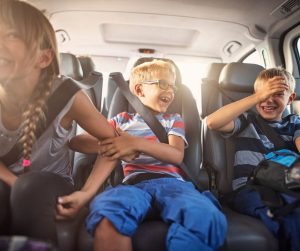 This month, Bonnie has invited guest writer, Abi Long, to offer her traveling insights for families.
This month, Bonnie has invited guest writer, Abi Long, to offer her traveling insights for families.
~ Bridgett Miller
1. Travel supports education and motivates kids to learn

Vacations give kids the opportunity to learn in an immersive manner. They can apply concepts they’re taught in school or from books to real-life experiences, and there’s plenty of research to back this up. When children apply attention to diverse experiences such as travelling, permanent changes occur within the brain related to knowledge and information reception. Plus, students who travel regularly perform better academically than those who don’t.
While on vacation, children have the opportunity to discover the art, history and culture of the places they visit while seeing it all in action. This can make them curious to learn more about different destinations in future, and help them to understand the value of learning as they wonder when their knowledge will serve them on future travels. Travelling poses plenty of opportunities to learn practical skills too. For example, they can work on their map-reading skills by plotting a sightseeing tour, or learn how to manage money by budgeting their spending money.
2. Travel helps kids to become more tolerant and accepting

Children’s brains develop most rapidly within their first five years. By exposing kids to as many different types of people and experiences within these years, you can help to normalise people and places that are unfamiliar to them. Although kids under five may not hold onto lifelong memories of family vacations, the experiences of different people, environments and foods will still shape their development in a very positive way.
The type of travel plays an important role in helping kids grow into adults who are accepting of different people. Although it’s valuable to see notable landmarks and tourist attractions, there’s even more benefit to walking around local neighbourhoods. This lets the kids get a glimpse of everyday life in unfamiliar destinations. Encourage them to sample local cuisine too, because trying new flavours, ingredients and textures is an important part of their development. Although children can be choosy about what they eat, the novelty of a vacation can make the prospect of trying new foods exciting. Plus, parents can lead by example when they try local dishes for the first time along with the kids.
3. Travel boosts confidence and self-esteem
When you take young children on vacation you expose them to a wealth of new experiences which teach them to be less afraid of the unknown. This can boost their confidence and help to shape them into adults who look forward to trying new things and facing unfamiliar situations. Vacations are also a great way to introduce kids to things that can be daunting to the uninitiated, such as travelling by plane, taking boat rides and sleeping in unfamiliar places. When kids use vacations as an opportunity to meet and play with other kids or try new activities, they also get a chance to practice their social skills which can make them more confident in building connections with others.
Children who feel sure of their ability to embrace new situations and people tend to have higher self-esteem and self-confidence. There’s a positive correlation between self-esteem and assertiveness, so it’s important to work on kids’ self-esteem at a young age to help them grow into assertive teens and young adults. Assertiveness is an important quality for future success because it supports effective communication and social interactions. Those who are confident and assertive make effective leaders and are more likely to believe themselves deserving of the things they aspire to achieve.
The benefits of travelling with young children are clear, and it’s never too soon to get started in broadening their horizons. Be sure to book that family vacation no matter what age your kids are, and you’re bound to see them thrive.
Author bio: Abi Long
I enjoy travelling around the world and am keen to share the social and developmental benefits that it can bring, far beyond just a nice trip away.
Related Articles:







